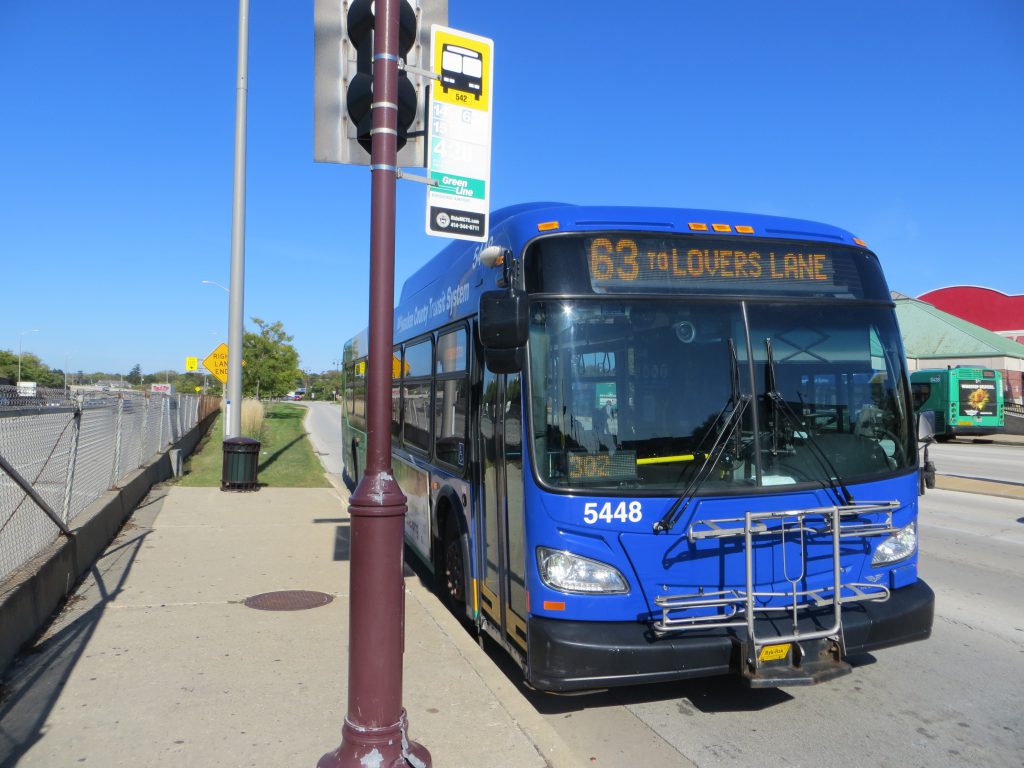MCTS Working On Bus Security. Again
Number of security incidents has declined but most bus drivers report feeling unsafe.

MCTS Bus. Photo by Michael Horne.
The issue of safety and security on public transit in Milwaukee County is once again being taken up by policymakers in county government.
Officials with the Milwaukee County Transit System (MCTS) went before the Milwaukee County Board of Supervisors on Tuesday with new data covering safety perceptions from riders and operators, and what kind of incidents are taking place on the buses.
However, incidents do still occur and criticisms of the current security situation raised during Tuesday’s meeting mirror those that have been brought up for years now. Leaders from the bus drivers union, Amalgamated Transit Union Local 998, once again related to supervisors that the current security officers, provided by private contractor Allied Universal, are powerless and that this emboldens the small number of riders who cause most of the incidents on the bus.
Donnell Shorter, president ATU 998, told supervisors, “This is 5% of our passengers, and they’re creating 95% of our problems.” The current Transit Security Officers, or TSOs, cannot issue citations or remove someone from a bus, and “the passengers realize that,” Shorter said.
Shorter noted that other transit systems have transit security forces with law enforcement powers. In 2019, the board looked into and debated the possibility of creating a county transit security force within the Milwaukee County Sheriff’s Office (MCSO). MCTS leadership was against the policy, while the union leadership of then-president James Macon advocated for it.
The MCSO estimated the cost to create a transit security division would be nearly triple the approximately $1.5 million the county annually pays Allied Universal. Sup. Peter Burgelis said he thinks the county has prematurely dispensed with looking into a county transit security force at committee, “What I’m hearing is that we’re not getting security from Allied.”
Shorter also said that bus drivers, particularly women operators, often complain about unwanted attention from men on the buses, especially at night and especially if the men have been drinking. There are dead spaces in the MCTS network for radio communications, and it can be particularly frightening for women operators to be driving a bus headed for what they know is a radio dead-space while they’re being harassed.
“When you don’t feel safe as a female operator, you’ll find another job,” Shorter said. “There’s a lot of jobs out there right now.”
At the committee Tuesday, MCTS officials outlined their approach to addressing safety and security concerns: clearly defining the scope of the problem and identifying gaps in security that can be addressed.
The system is using a data-driven approach to addressing the problem. Dan Basile, MCTS chief operations officer, said MCTS developed a clearinghouse for the collecting and analyzing of incident data in 2017. “We are beginning to understand the different behaviors on the buses,” he said. “There is disruption and then there is a security incident.”
The overall number of incidents recorded is declining to pre-pandemic levels, after spiking at the start of the pandemic in March. The most common incidents are fare disputes (38%) and extended riders (43%). Both of these Basile said, are likely better addressed through better, more clearly articulated policies.
The annual passenger survey shows that as of 2021, 8% of respondents said they felt unsafe on a bus, and 10% said they witnessed something concerning. This was down from 2019 and 2020, when 9% felt unsafe in each year, and 13% (in 2019) and 10% (in 2020) reported witnessing something concerning.
The chief reasons for safety concerns as of 2018 were fights, uncooperative passengers, drunk passengers and loud and profane language, according to the data provided by MCTS. The majority of respondents also said that bus security meets their needs.
But the results from a survey of bus operators tell a different story. MCTS has been conducting an employee survey for only two years. A majority of operators who responded feel sufficiently trained (66%). But 56% don’t think MCTS has appropriate security measures in place, and 61% say they don’t feel safe at work.
Some suggestions include more de-escalation training for operators, using data to better deploy TSOs, a public education campaign about the role of bus security and public transit rules, clarifying policies for riders and passengers and identifying factors that slow down response times. None of the many suggestions involved increasing law enforcement presence or a new transit security force.
Political Contributions Tracker
Displaying political contributions between people mentioned in this story. Learn more.
MKE County
-
Key Questions in Dugan Trial Take Shape on First Day
 Dec 15th, 2025 by Graham Kilmer
Dec 15th, 2025 by Graham Kilmer
-
FTA Tells Milwaukee to Crack Down on Fare Evasion — Even Where Fares Don’t Exist
 Dec 12th, 2025 by Graham Kilmer
Dec 12th, 2025 by Graham Kilmer
-
Legal Filing Describes ‘Horrid Living Conditions’ at County Jail
 Dec 11th, 2025 by Graham Kilmer
Dec 11th, 2025 by Graham Kilmer
Transportation
-
Congestion Pricing Cuts Air Pollution in New York City
 Dec 14th, 2025 by Jeff Wood
Dec 14th, 2025 by Jeff Wood
-
FTA Tells Milwaukee to Crack Down on Fare Evasion — Even Where Fares Don’t Exist
 Dec 12th, 2025 by Graham Kilmer
Dec 12th, 2025 by Graham Kilmer
-
Will GOGO’s Bus Service Ever Get Going?
 Dec 9th, 2025 by Jeramey Jannene
Dec 9th, 2025 by Jeramey Jannene






















What is an “extended rider”? Is it a way of saying a homeless person who won’t get off at the end of the line?
TransitRider: From the article: Extended riders are passengers who get on a bus just to ride around on it until they are forced to get off. These are often people who are homeless or going through some type of crisis, Basile said.